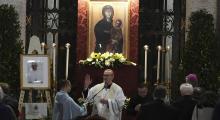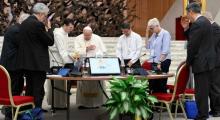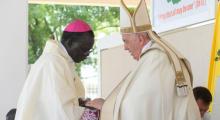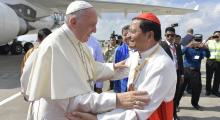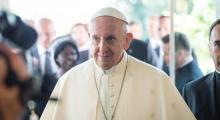Issued by the Catholic Center for Studies and Media - Jordan. Editor-in-chief Fr. Rif'at Bader - موقع أبونا abouna.org
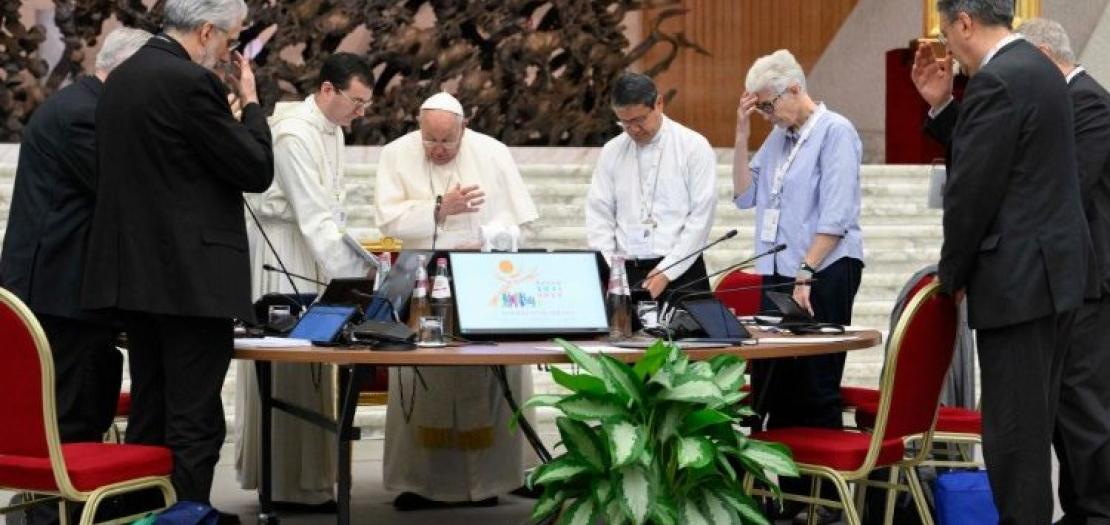
Pope Francis prays with the Synod Assembly on October 12, 2024
Over the twelve years that he led the Catholic Church, Pope Francis has left an imprint that has transformed the mentality of the Church. The Holy Father's attention to “synodality,” has been truly a journey that has moved the Catholic Church in unprecedented ways.
Most recently, the Holy Father personally oversaw the two sessions in the Vatican of the 16th Ordinary Synod of Bishops on Synodality, in 2023 and 2024, which gave flesh to his desire to invite every individual in the Church to 'walk together' and move forward, even if that means agreeing to disagree, or simply listening, or being present.
This Synod ran its course over several years and gathered input from the Catholic faithful and the Church around the world, characterized by its roundtables, which contributed to open and frank discussions among all participants.
Meanwhile, representatives of the ten Synod Study Groups set up by the Pope recently met and presented updates on their work, continuing the theological exploration of topics raised by the first session of the Synod General Assembly.
Pope Francis made it clear that he fully embraced the final document produced by the Synod’s second session and encouraged the Church to continue the synodal journey for the long run.
As the Holy Father said in a letter to the Theology Faculty of Triveneto in northern Italy, Catholics are called to transmit Christ's message worldwide in a way that respects and treasures the traditions of the past, but also remains open to the signs of the times.
In March 2025, while being treated for bilateral pneumonia at Rome’s Gemelli Hospital, Pope Francis officially initiated a new phase in the Church’s synodal journey by approving an accompaniment process that will culminate in an Ecclesial Assembly in 2028. While the assembly will not be a new Synod, it refers to the implementation phase of the three-year Synod which concluded in October 2024.
In these twelve years of leading the Catholic Church, Pope Francis oversaw several Synods, such as the Synod on the Family in October of 2014 and 2015, on Young People in 2018, on the Pan-Amazonia region in 2019, and the most recent Synod on Synodality.
After each of these, with the exception of that on Synodality, due to its particular and participative nature, the Holy Father issued Apostolic Exhortations that have remained precious resources for the Church, such as 'Amoris laetitia' on the family, Christus vivit on, and addressed to, young people, and Querida Amazonia on the Amazonia.
In Christus vivit, the Holy Father encouraged young people to give meaning to their lives by clinging to the Lord, turning to Him in all their needs, and offered guidance on how to grow in holiness.
In his document on the family Amoris laetitia, Pope Francis encouraged families in their vast complexity to go forward in faith despite the challenges they may face. He called for a better education of children and for families to pursue tenderness, hope, and love, as was embodied in the Holy Family. Ever aware of the pastoral challenges facing families, the Pope expressed words of comfort and mercy for all families amidst their struggles.
Regarding the Synod, Pope Francis ushered in developments that had never taken place before, including the first-time that women were allowed to vote in the Synod General Assembly, which had begun first with the vote of Sr. Nathalie Becquart following her appointment as Under-Secretary of the Secretariat of the Synod.
However, there are several elements that should not be underestimated.
The Synod on the Amazonia reflected the Holy Father's insistence on taking care of the environment that the Lord offered humanity in Creation.
Recalling that the Amazon rainforest is the “green lung of the planet,” the Pope emphatically called for changes of behavior to stop exploiting the region. His vehement appeal marked another milestone in the Pope's insistence on protecting our common home, as he stressed in the first-ever papal Encyclical on the environment, Laudato si', and his subsequent Apostolic Exhortation which built upon it, Laudate Deum.
Certainly, Pope Francis offered his message of closeness and faith to all through these Synodal assemblies. He was never concerned about the reactions they could spark, but rather simply with listening to the Holy Spirit's guidance to the Church in the here and now, as Christians have sought to do ever since the Lord left us His Paraclete.


